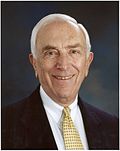| County | Lautenberg votes | Lautenberg % | Haytaian votes | Haytaian % | Other votes | Other % |
|---|
| Atlantic | 29,161 | 52.6% | 25,071 | 45.2% | 1,257 | 2.3% | | Bergen | 131,252 | 50.8% | 122,843 | 47.6% | 4,165 | 1.6% | | Burlington | 50,473 | 49.3% | 47,974 | 46.9% | 3,912 | 3.9% | | Camden | 70,288 | 58.5% | 44,799 | 37.3% | 5,058 | 4.2% | | Cape May | 14,398 | 44.4% | 16,931 | 52.2% | 1,079 | 3.4% | | Cumberland | 14,657 | 48.4% | 14,458 | 47.7% | 1,182 | 4.0% | | Essex | 107,082 | 62.7% | 60,671 | 35.5% | 3,116 | 1.8% | | Gloucester | 34,458 | 50.6% | 30,429 | 44.7% | 3,231 | 3.8% | | Hudson | 67,532 | 64.8% | 34,211 | 32.8% | 2,430 | 2.3% | | Hunterdon | 11,792 | 33.7% | 22,179 | 63.4% | 989 | 2.8% | | Mercer | 46,175 | 53.8% | 37,266 | 43.4% | 2,432 | 2.8% | | Middlesex | 90,873 | 53.6% | 72,787 | 42.9% | 5,993 | 3.5% | | Monmouth | 75,636 | 46.4% | 83,534 | 51.2% | 3,888 | 2.5% | | Morris | 49,241 | 38.7% | 75,717 | 59.5% | 2,237 | 1.8% | | Ocean | 59,405 | 42.5% | 76,250 | 54.6% | 3,976 | 2.8% | | Passaic | 48,067 | 49.2% | 47,152 | 48.2% | 2,563 | 2.7% | | Salem | 8,876 | 45.8% | 9,577 | 49.5% | 906 | 3.7% | | Somerset | 31,978 | 41.7% | 42,812 | 55.8% | 1,931 | 2.6% | | Sussex | 11,332 | 31.0% | 24,024 | 65.7% | 1,195 | 3.3% | | Union | 70,904 | 53.0% | 60,195 | 45.0% | 2,661 | 1.9% | | Warren | 9,907 | 35.1% | 17,364 | 61.5% | 955 | 3.4% | | Total | 1,033,488 | 50.3% | 966,244 | 47.0% | 55,156 | 2.7% |
Counties that flipped from Democratic to Republican [14] |




